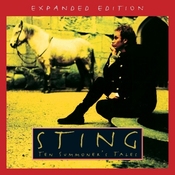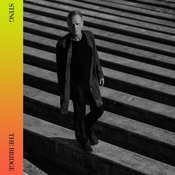Mercury Falling
- The Hounds Of Winter lyrics
- I Hung My Head lyrics
- Let Your Soul Be Your Pilot lyrics
- I Was Brought To My Senses lyrics
- You Still Touch Me lyrics
- I'm So Happy I Can't Stop Crying lyrics
- All Four Seasons lyrics
- Twenty Five To Midnight lyrics
- La Belle Dame Sans Regrets lyrics
- Valparaiso lyrics
- Lithium Sunset lyrics

Soundbites
"This was the second album written and recorded in Lake House. I was enjoying these long periods at home with the family. I'd spend so much of my life in hotel rooms and concert halls. I felt that at last I was living a real life. The kids would come home from school in the afternoon and we'd all have dinner together like a normal family. I suppose the album title suggests, among other things, that my mercurial life was beginning to find some balance, like I'd finally put down roots. I'd always believed that "settling down" was anathema to creativity, but I wanted to give it a shot. I felt it was my right. The band loved being there too. Dominic Miller, David Sancious, and Vinnie Colaiuta were all delighted not to be stuck in some airless studio for weeks on end; I even caught Vinnie, our drummer (a certified studio animal if ever there was one), walking in the garden one morning. I'd never seen him up before noon, much less out taking the air. He of course claimed that he was but sleepwalking after the previous night's carousing."
Sting, Lyrics, 10/07
"There are so many references attached to mercury. I mean, it's a metal, it's a liquid, it's an element, it's a god, it's a planet. It's an idea - 'mercurial,' I think, is a valuable description. I use the phrase initially very literally. You know, it's getting cold, the thermometer's falling. And then I use it symbolically at the end. I love the phrase. It's very resonant, full of so many things.''
Sting, The Baltimore Sun, 3/96
"The title of the new album is 'Mercury Falling'. It was the first lyric I wrote, the first line of the first song called 'The Hounds Of Winter'. But the lyric has a lot of reverberations, it means other things - it has an astrological context, it has an astronomical context, it has a meteorological context, it has a symbolic context, and the whole idea of being mercurial is an image I've always responded to. I mean, there are so many styles on this record and it darts around from genre to genre and back again. It's a very mercurial record, and it seemed to be the right thing to call the record. And at the end of the record I return to this idea of mercury falling - only to rise again."
Sting, 'Mercury Falling' Promotional Interview Disc, '96
"When I was fifteen, sixteen which was the time of my rampant puberty and discovering sex and dancing and going out and drinking, it coincided with the boom in soul music - Otis Redding, Sam and Dave, Booker T and the MGs, James Brown - so that music means a great deal for me. If I look back to a golden age in my musical life its probably then. If I pick my favourite ever songs, they're 'Dock Of The Bay', 'When A Man Loves A Woman' - all that sort of stuff. So having written these songs I decided to borrow the Memphis Horns who played on all of those records. They came over from Memphis, they're wonderful guys, they sound exactly like they did on the records - it's almost like seeing a masterpiece in your house, an old painting. I tortured them a little bit by asking them to play in strange time signatures they hadn't played in before, but they enjoyed the challenge and I think the sound on the record is very nostalgic. At the same time I'm not really producing a homage to Stax Soul Music. I'm using it and putting an ironic, objective view on it, I'm twisting it and perverting it in a way which makes it more me. I'm not interested in remaking records that were brilliant - what's the point You can't better Sam and Dave or Otis Redding but you can twist it a little bit to make it more me. So it's definitely a Sting record."
Sting, 'Mercury Falling' Promotional Interview Disc, '96
"The personality of the house does invade the record somehow. The studio's in the dining room, so I can enjoy my kids coming home from school, or take a walk in the garden while trying to work out the lyrics. Living closer to nature here brings you much closer to the cycle of seasons, and I think that's really reflected in many of the songs. Seasonal ideas that can be broken then mended, that you can die in winter and live again in spring recur in the lyrics."
Sting, 'Mercury Falling' Tour Programme, '96
"I don't like to make musicians feel too comfortable with what they are doing. Making the Memphis Horns play in 9/8 or 7/8 really threw them. But, in the end, they got it and it sounded great."
Sting, Music Week, 3/96
"The new songs are full of seasonal ideas: that you might die in winter yet be born again in spring. That you can be broken and then mended. Even the title, 'Mercury Falling', which was the first phrase that came to me when I started writing, keeps reverberating in new ways. I was very 'mercurial' in jumping around from genre to genre and mixing things on this album. And Mercury was the thief of the gods, so I stole from everywhere."
Sting, Guitar World, 7/96
"I have to reflect my moods, my memories, my hopes, my anxieties, my nostalgia and love for whatever's happening. That's my brief to myself when I make an album - it's a heartfelt expression of me. This is a hopeful record, and I'm proud of it. I've had enough loss and sadness in my life not to be autobiographical, even now. I know what it's like to be heartbroken. Also, I think the universe is reflected in relationships and that you can tell a love story that expresses the whole of existence. And I find difficult relationships more interesting to write about. In general though, my work is less confessional than it used to be."
Sting, Interview Magazine, 7/96
"I like 'Mercury Falling'. Sure, parts of it are blue. I think if I'm being honest in my work a record must map my emotions and my experiences."
Sting, Philadelphia Inquirer, 6/00
"In the past I've written albums that were related to death - either the death of someone I loved or the death of a relationship or whatever. But now I've reached a stage in my life where I don't see death as the end to anything. I see death as merely another door to open, and I think the songs perhaps reflect that openness about death or the ending of things and that I'm much more comfortable with the idea. I suppose the songs are as much about rebirth as much as death and new beginnings as much as they are about endings."
Sting, 'Mercury Falling' Promotional Interview Disc, '96
"There are songs on this record about accepting things you can't change. And there are songs about romantic situations that don't have a happy ending. It's not the standard fare of pop music at all. But if pop music is just about being in a gang or dancing or frivolous youth stuff, then I'm in the wrong business. If it's fuddy duddy music so be it. But this is what I am and I'm proud of it. I'm not afraid of being attacked or ridiculed. I've been there before. Views on me are very disparate: I'm either a decent man or a complete shit. The truth is I'm somewhere in the middle."
Sting, The Independent, 2/96
"I do feel very relaxed these days. Not complacent, but relaxed. I think if there's a theme on this record, it's one of acceptance about things that can't be changed. Not one thing in particular. It's just that in the past, in my young life, I tended to fight against everything, struggle against the whole of life. I suppose I'm just getting older. In the past I used to worry a great deal - about writing songs, about whether I was writing enough. But now I just let it happen. I don't put myself under too much pressure, because that just kills the creativity."
Sting, TOP Magazine, 3/96
"Maybe I'm not asking so many questions on this record, but I'm accepting the fact that there is a question - accepting that mystery as part of life. I've been studying philosophy for a long time. I read books about these eternal problems. As for not coming up with any answers, the greatest philosophers in history can be accused of that!"
Sting, TOP Magazine, 3/96
"This album was easier than some. It's always hard to write and always hard to better yourself and dig deep, but at the same time there's a great deal of therapy in writing. And my intention was not to make music that was angry or difficult, because I'm not angry. If there's a theme on the record that's consistent, it's one of acceptance of things that cannot be changed. I don't want to give the impression that I'm complacent, because there are certain things in life that do anger me and make me want to fight to change them. But I also am able to recognize the things that I simply should not bother fighting against. One is age - growing old and dying. It's one of those things to learn acceptance of. I think a lot of the new songs are about that."
Sting, The Boston Globe, 3/96
"Well, 'Mercury Falling' is certainly more straightforward than the last album. There are lapses into complex meters, but I've tried to disguise it a lot more this time, to not be so self-conscious about it."
Sting, Guitar, 4/96
Backgrounder
Review from the New York Post by Dan Aquilante
Many would say Sting's barb isn't as sharp as it was when he and his original band, the Police, first collared its audience. Yet on his latest solo album, 'Mercury Falling', the man continues his life-long musical experiment of weaving world beat rhythms and instrumentation with the basics of rock, jazz and pop.
This new 10-song disc is an extension of Sting's '93 turnaround album, 'Ten Summoner's Tales'. Unlike his very early solo work, which was as annoying as Amazon rain forest mosquitoes because of preachy politics, 'Summoner' and now 'Mercury Falling' wrestle with life one day, one joy, one problem at a time.
'Mercury Falling' has a lean, aggressive sound that shamelessly borrows from any style that stung Sting. There are elements of traditional Celtic arrangements, jazz, country and even R&B. It's just a guess, but since Sting is a gifted bassist, you'd assume he writes music from the rhythm tracks rather than usual chord patterns. That would explain how he gives power to many of the songs on 'Mercury' and how he is able to make the mood of the music so clear, so quickly.
For instance, 'All Four Seasons', sets itself up with the syncopated heel-click strut. Even though Sting sings "the girl is all four seasons to me," the song is breezy and pure spring. In sharp contrast is "I Hung My Head", which has a weird tempo that makes the intense, almost country song about an accidental death edgier.
Musically this album is pleasant and melody-oriented enough that it can be used as background for a gathering, but 'Mercury' is best when it can be listened to with focused attention. Then the literate lyrics, which are as simple and complex as a Robert Frost poem, are able to tell their story.
As always, Sting's voice is terrific, the songs are sturdy and the musicianship superb.
'Mercury Falling; makes a convincing argument that 'Summoner' wasn't a fluke. As Sting gets older he's become more ambitious and more fluent in his attempt to make music a universal language.
Review from Q magazine by John Aizlewood
As if to show that some people can't have all the luck, looks, brains and talent all the time, Sting has been cocking it up of late. First came the frankly criminal activities of his accountant, where the pop star appeared to be too rich and too stupid to notice he'd been ripped off for millions. More recently came his comments about ecstasy. All fairly reasonable and just about medically supportable in the cold light of day but mixed with a dose of tabloid hysteria (how it got into those tabloids might make interesting reading: presumably it wasn't a deliberate ploy to raise awareness of 'Mercury Falling' and the unfortunate Sting was, indeed, truly stitched up by scummy journalists) and distraught calls to his record company from the father of dead drug-taker Leah Betts, it took on the air of a statement by someone who'd taken his eye off the ball. After making records for 19 years, most of them as one of the most famous men on the planet, it's easy to understand, if not sympathise, with things going slightly awry and Sting slipping slowly out of touch with reality.
The Police made some awful records. Generally these were the ones where Stewart Copeland or Andy Summers were given more input than their songwriting skills deserved, but 'Tea In The Sahara', 'One World (Not Three)' and 'Walking On The Moon' show that Sting too was not immune. No wonder Elvis Costello wanted to give him a clip around the ear for singing in a ridiculous Jamaican accent. Initially he adapted uneasily to a solo career, which has now lasted longer than The Police. 'The Dream Of Blue Turtles' was bloody hard work in the sense that an eight-hour shift down a pit is still less arduous in comparison and it looked as if he was in danger of losing his mass audience and ending up a jazzman, perhaps the musical direction he'd always coveted deep down.
Similarly, 'The Soul Cages' suggested that the death of a loved father is a heart-wrenching tragedy, but however dignified Sting's response may have been, an album mostly about the event made for rather dull listening. In between the sprawling '...Nothing Like The Sun' showed he could do it when the mind took him and, in 'They Dance Alone', could write an affecting and explicitly political song too.
1993's 'Ten Summoner's Tales' confirmed everything was right in Sting's musical world. He was selling records world-wide like a bastard anyway, so it wasn't a surprise that it hovered around most charts for over a year. What was eyebrow-raising was that the album was the career-defining work he'd never truly looked like delivering. Gone was the angsty smugness, replaced by 'If I Ever Lose My Faith In You', 'It's Probably Me', 'Love Is Stronger Than Justice (The Munificent Seven)' and, obviously his best song to date, 'Fields Of Gold'. This, historians may very well say is classic pop music.
What, then, having conquered the world, to do next In a sense it doesn't matter any more than it did with 'Ten Summoner's Tales'. The hottest of hot cakes will be slack and mediocre sellers compared with those of 'Mercury Falling' as it zings from shelves the world over. Sting could have taken the easy way out - the covers album often used to prop up ailing careers (see Robert Palmer, Bryan Ferry); that jazz album he seems to think is in him somewhere (see Van Morrison) or the slipshod, can't be arsed, affair of those who've lost the will to care or the need to protect their dignity (see Rod Stewart). Sting, bless him, has knuckled down to the task in hand and 'Mercury Falling' is just about all it might have been , Overall, it lacks the pop joy of 'Ten Summoner's Tales' but, from the bleak 'The Hounds Of Winter' (offset, quietly but wittily by the sounds of baying hounds - hopefully Afghan, more likely Sting himself - buried way down in the mix) to the sombre but Byron-esque 'Lithium Sunset', 'Mercury Falling' is a deeper, more rewarding work.
There are clever touches, no Sting album would be complete without them. There's no title track, but "mercury falling" is the first line of the first song and the last line of the last song. It's a wise move, for never has an album sounded quite so rounded. Less pleasing and not entirely unpredictably 'La Belle Dame Sans Regrets' is sung entirely in French. The tune is nothing to write home about - in any language - and Sting sounds like a pillock, forgetting for once that being sophisticated means never having to try too hard. Elvis Costello may well need to get his slapping gear out again. Elsewhere, though, it's hosannas, bouquets and Faberge eggs all round.
Unusually and unfashionably for a pop star in 1996, Sting is a story teller, a trend he began on '...Nothing Like The Sun's' 'Rock Steady' and one which he has refined here. 'I Hung My Head' - desperate at many points to become Into 'The Great Wide Open' by Tom Petty & The Heartbreakers - is the sorry tale of a young man who shoots a man "to practice my aim" and, full of remorse, is hanged at dawn, without a silly last verse twist or any suggestion of a miscarriage of justice (something the younger Sting wouldn't have been able to resist). As well as being brilliantly constructed, it's genuinely moving, as is 'I'm So Happy I Can't Stop Crying', the diary of an abandoned husband and "Sunday father" putting a brave face on everything. More slapstick is the jaunty 'Twenty Five To Midnight', where a would-be pop star ("We called ourselves The Latino Lovers/Hawaiian shirts and Top 40 covers/I didn't think I could sink this low") speeds home to stop his smalltown girl marrying his best (so-called) friend.
There are no love songs here, except, at a push, 'All Four Seasons', a more cynical but still virtually incestuous lyrical cousin of Crowded House's 'Four Seasons In One Day'. Many of 'Mercury Falling's' characters seem to be remorseful Lotharios. 'The Hounds Of Winter', a song with its coat collar turned up if ever there were one, 'I Was Brought To My Senses', 'You Still Touch Me' (echoes of Sam & Dave's 'Soul Man') and the gorgeous 'Valparaiso' recall past loves, with a resignation close to Paul Young's version of 'Wherever I Lay My Hat (That's My Home)'.
The near seven minutes of 'Let Your Soul Be Your Pilot' is the album's centrepiece. Lyrically, it's an update of 'Bridge Over Troubled Water', a message of hope to a tortured soul, but musically it oozes quality, using Branford Marsalis, The Memphis Horns and The East London Gospel Choir to sound both powerful and restrained. Like the rest of 'Mercury Falling', there are no great conceits here, just Sting playing to his strengths.
Ultimately, despite those non-musical recent hiccups, Sting is still the wise and cunning man of pop, one whom it's still somehow difficult to love, but impossible not to admire. He's out there on his own, working hard, making intelligent pop, writing intriguing songs, sounding more unlike anyone else (that voice is without impersonators save Spitting Image and without acolytes full stop) than ever and selling literally millions of records in the process. He must wonder why Michael Stipe gets all the kudos.
Review from Time magazine by John Farley
Sting, unlike Boy George and David Lee Roth, will never be an answer to such trivia questions as, "Name a lead singer from an '80s megaband who went on to have a disappointing solo career." Sting has managed to stay relevant - and popular - by continuing to create gently innovative music that borrows from other sources so wisely and so well that the resulting sound is truly his own. "I'm interested in impure music," says Sting. "Pure rock, pure jazz or pure anything just doesn't interest me. This is the game I play." In that spirit, his new CD, 'Mercury Falling', draws on country, gospel and even Celtic music to create smooth, genre-blending, articulate pop. It's another bright entry in what has proved to be Sting's brilliant career as a solo artist.
Given his more than 20 years in the music business, there is little on vinyl or CD that Sting has not already had a chance to be inspired by. "I have teenage children, and I hear their music in the house, by accident - I'm intrigued," says Sting, comfortably domesticated at age 44 (a wall in his huge getaway apartment in New York City is covered with pictures of his six children and his second wife, actress and film producer Trudie Styler). "But with new pop music, it's very rare that I hear music that I can't recognise its source. Oasis are the Beatles, basically. Blur are the Kinks."
Sting, however, is Sting. In 1985, after almost a decade fronting the reggae-tinged rock band the Police, Sting launched a solo career with the release of 'The Dream Of The Blue Turtles', a slickly adventurous album that featured saxophonist Branford Marsalis and keyboardist Kenny Kirkland. All Sting's six solo albums have been distinctive: 'The Dream of the Blue Turtles', with its anti-cold war rant 'Russians', was the most pointed; the 1991 release 'The Soul Cages', much of which concerns the death of Sting's father, was the most personal. 'Mercury Falling' stands out as his most consistently entertaining effort. The lyrics are smart but not ostentatiously cerebral. The instrumental work of Kirkland, who performs on all the new tracks, and Marsalis, who plays on two, adds shading and sophistication. These are songs that hit a little harder than the typical Top 40 tune: the clever 'I Hung My Head', with its commanding horns, and elevating keyboard work, tells the story of an accidental shooting, and could also be read as a plea for gun control; 'I'm So Happy I Can't Stop Crying' is a countryish tune that clomps along with a steady beat but is also a well-observed look at a divorced man dealing with the fact that he has lost custody of his kids. Indeed, most of 'Mercury Falling' deals with loss, longing and epiphany. On its best cut, 'I Was Brought to My Senses', Sting sings, "...And inside every turning leaf/Is the pattern of an older tree... Every signpost in nature/Said you belong to me."
Sting claims he is still sorting out the meanings of the songs on 'Mercury Falling'. "I write unconsciously," he says. "It's only after I've finished the songs that I'm able to tell you what they're about. It's a form of therapy really - 'What am I talking about here Why am I worried about this' It's a cheap form of psychiatry."
That uncertainty beneath the cool is the key to Sting's appeal. Absolute certainty is boring; once you're cocksure of your meanings and your sound, you may as well go on tour with Kiss - or David Lee Roth for that matter. Appropriately enough, given the the title of the new album, Sting remains mercurial.
Review from USA Today by Edna Gundersen
As its title unintentionally suggests, Sting's sixth solo outing isn't the high point of his career. The 10 smartly crafted pop songs roam the map from bossa nova ('La Belle Dame Sans Regrets') to country ('I'm So Happy I Can't Stop Crying'), yet seldom stray beyond the former Police chief's safe realm of radio-friendly pop-rock. Even ambling ballad 'Let Your Soul Be Your Pilot', with its 70-voice choir, is gospel lite. As usual, Sting flatters his material in complex but unshowy arrangements - a fiddle gently massages the sweet 'I Was Brought to My Senses', and the Memphis Horns complement the singer's upbeat mood on 'All Four Seasons', inspired by his daughter Coco's caprice. Sting fancies himself a wordsmith, but his metaphor-laden lyrics can be ambiguous. Still, he broods brilliantly as the abandoned lover on 'The Hounds of Winter' and ably displays sunnier sentiments in 'Lithium Sunset' and the soul-kissed 'You Still Touch Me'.
Review from Rolling Stone magazine
With 1993's 'Ten Summoner's Tales', Sting wilfully soiled his hard-earned reputation as pop music's poster boy for existential depression. Tales was his most light-hearted effort since his early days with the Police, and it seduced many who had otherwise found his solo work too solemn or ponderous. But for all its breezy wit and craftsmanship, Tales didn't quite pack the emotional punch of Sting's other albums particularly 1991's hauntingly lyrical (and oft-maligned) 'Soul Cages'. Sting's moody thoughtfulness has always been part of what gives his work character; asking him not to brood is like asking Lou Reed not to rant.
On 'Mercury Falling', Sting manages to stay true to his pensive nature while injecting healthy doses of levity into the mix. Rather than deflecting his doubts and concerns as he seemed to do on 'Tales', he confronts them with equal parts irony, hope and wistful resignation. As its title suggests, changing weather is a prominent motif, a symbolic caprice in relationships. On 'The Hounds of Winter', Sting wails over a mournful synth backdrop about a lover who has deserted him.
'All Four Seasons' is a more playful account of an unpredictable woman, with sax and trumpet fills by the Memphis Horns. The subtly intricate arrangements reflect the ambiguous emotions that characterise all the songs here, from the beautifully tender and fiddle-laced 'I Was Brought to My Senses' to the country-flavoured 'I'm So Happy I Can't Stop Crying', which sneaks plaintive minor chords into blithely twangy guitar riffs.
Granted, it's seldom clear what drives Sting's ambivalence. Even in an introspective mode he's a pretty elusive guy, often constructing elaborate metaphors to fake us out. Who knows what guilt lies behind the accidental murder on the deftly syncopated 'I Hung My Head' or what loss inspired the gently funky 'You Still Touch Me' By the end of 'Mercury Falling', all were really sure of is that Sting has survived these experiences without growing bitter or cynical. For a literate British songwriter who once called himself the 'King of Pain', that's no small accomplishment.
Review from The Washington Post by Nicole Arthur
It isn't easy for rock-and-rollers to age gracefully. Sting has fared better than most: Now approaching 50, the once swaggering singer is regarded as one of the music's pre-eminent elder statesmen. It has been nearly 20 years since the Police's first album, and Sting is now a father of six who lives on a 16th-century country estate. Not surprisingly, he is eager to assert that middle-age and domesticity are no less generous muses than youth and rebelliousness. "In the past, I thought that to be creative, you had to suffer somehow," he declared in a recent profile.
Suffering has always been Sting's speciality. Prone to joyless philosophising, he is known for his gloomily introspective lyrics. Yet despite its title, 'Mercury Falling', Sting's sixth solo album isn't nearly as chilly as much of his other work. Like 1993's 'Ten Summoner's Tales', the disc finds him in an uncharacteristically optimistic frame of mind. (As well he might be - his record company bio describes him as an almost shamanistic figure, "a global traveller and pathfinder in realms of the soul.")
The 10-song disc, Sting's first in three years, is marked by stylistic variation. Guitarist Dominic Miller, keyboardist Kenny Kirkland and drummer Vinnie Colaiuta are joined by guests as disparate as the Memphis Horns and the East London Gospel Choir. Indeed, Sting's pastiche of musical genres seems nearly all-inclusive: 'Valparaiso' boasts Celtic flourishes; 'Let Your Soul Be Your Pilot' is a gospel anthem; there's a country flavour to 'I'm So Happy I Can't Stop Crying'; 'All Four Seasons' is a horn-driven romp; and 'La Belle Dame Sans Regret' is set to a modified bossa nova.
In keeping with its title, seasonal metaphors are spread throughout 'Mercury Falling'. In 'The Hounds of Winter', for instance, the time of year parallels the narrator's mood. "I'm as dark as December," the abandoned lover intones. But this is the kinder, gentler Sting, and the cyclical aspect of the seasons also holds the promise of change: "There's a season for joy/ A season for sorrow," he sings. In 'All Four Seasons', Sting describes his volatile daughter, marvelling that "she can be all four seasons in one day."
'Mercury' is a sort of testimonial for the benefits of being in harmony with nature. In 'I'm So Happy I Can't Stop Crying', a song about a newly divorced dad relegated to weekend visits with his kids, the singer finds solace in recognising "something about the universe and how it's all connected." Like a horticultural Dr. Doolittle, Sting even makes conversation with the natural world: In 'I Was Brought to My Senses', he sings, "Every blade of singing grass was calling out your name," and in 'You Still Touch Me', he claims that "I seem to hear the raindrops saying you won't come back."
The disc contains nods to many genres, but Sting doesn't seem at home in any of them; though Mercury is distinguished by technical excellence, much of its material has an affected air. And the experimentation is not without its missteps: 'I Hung My Head', a sort of Sting-style 'I Shot the Sheriff' in which a man denounces himself for having killed someone, is notable for its unconvincing employment of Old West imagery (gallows on a hill, "my brother Jed"), while 'La Belle Dame Sans Regret', sung in imperfect French and backed by cocktail lounge piano, sounds like the background music at the Limited Express. Superficially and seamlessly eclectic, 'Mercury Falling' is respectable without being compelling.
Review from Guitar Techniques magazine by David Mead
Sting has long since established his genius for writing excellent pop/rock songs with a homing instinct for the top of the charts. His last studio album 'Ten Summoner's Tales' was bursting with hits and this, its worthy successor, continues that trend. 'Mercury Falling' is probably Sting's most mature album to date. There isn't a hint of a filler track on the CD, each has single potential and an almost narcotic effect on the ear.
Genre juggling has always given Sting's music fresh twists and that is much in evidence here, too. The country style 'I'm So Happy I Can't Stop Crying', complete with weepy steel guitar provided by BJ Cole is a bit of a shock to the system, but it's done so well (and is so damn catchy!) that you can't help but applaud. There's another cowboy song in 'I Hung My Head' and a couple of soul-inspired workouts (with the Memphis Horns) as well as the gospel overtoned single 'Let Your Soul Be Your Pilot', each standing up as near perfect examples of well-crafted songwriting.
Dominic Miller's guitar is always in evidence as he deftly switches between nylon string, acoustic and electric to provide an object lesson in inventive, on-the-nail guitar work which underlays Sting's masterful melodies with consummate ease. A classic.
Review from Music Wire magazine by Ed Hewitt
Sting almost demands that his albums be treated like metaphysical poems, so cloaked and tangled are their conceits. Beginning with the choice of title, a phrase that serves as the first and last words on the album, 'Mercury Falling' requires the full treatment.
Never straying too far from the title metaphor, Sting depicts the rise and fall of human fortunes and emotions, the cycles of despair and hope as reliable as day after night, spring after winter, warm after cold. You get the idea. Songs occur at dawn or heading into dusk, or under the dim light of guiding stars. Each song chronicles a transition from some deep chill to, in some cases, an almost blinding sense of hope and possibility. That the album ends with 'Lithium Sunset', a song based on the notion that sunset light emits depression-soothing lithium, is no accident - heading into yet another night, Sting finds healing in the very light that is fading away.
And Sting has taken a curiously mercurial stance on the styles of music he employs to help him make his points. From new-agey harp music to snorting R&B, Sting mixes and matches styles almost capriciously. The effect is like that of mythical beings with the body of a horse and the head of a fish, and vice versa; or, less charitably, one of those panelled kids' books that let you mix and match heads, torsos and legs to make strange, hybrid creatures.
A bossa-nova, 'La Belle Dame Sans Regret', complete with a one-handed piano solo a la Jobim himself, is inexplicably sung in French. 'Lithium Sunset', inspired by a visit from a Brazilian shaman, features a Ringo-esque tambourine backbeat. The blue-eyed soul of 'Let Your Soul Be Your Pilot' coasts out on a static gospel choir (if everyone else on the planet were not doing the same thing, it would be interesting - did you see the Grammies). But then, in the very next song ( the 7/8 'I Was Brought To My Senses', which owes a vague debt to Whitman), Sting sings "I was blind/Now that I can see," from 'Amazing Grace' as Branford Marsalis' soprano sax soars behind him.
'You Still Touch Me' kicks off with the unmistakable opening riff from the Blues Brothers' 'Soul Man'; two songs later, a genuine soul groove surfaces in 'All Four Seasons'. The Marty Robbins -style, Wild West murder tale of 'I Hung My Head' is in 9/8, while 'I'm So Happy I Can't Stop Crying' features a more standard country beat.
These tactics sometimes suggest a jumbled unity that might be easily mistaken for disjuncture, confusion or just plain messiness. All the pieces are there, just not where you would expect them. But it is in the unlikely 'I'm So Happy...', a bracingly straightforward song about the aftermath of a divorce, with a country lilt and steel guitar licks, that Sting tips his hand with the key to the puzzle: "I looked up at the stars/To try and find an answer in my life/I chose a star for me, I chose a star for him/I chose two stars for my kids and one star for my wife/Something made me smile/Something seemed to ease the pain/Something 'bout the universe/And how it's all connected."
As Laurie Anderson once said, "you connect the dots, you pick up the pieces."
Review from Billboard magazine
As if anyone needed reassurance that Sting is one of the most gifted songwriters around, the British star has delivered an album that stands up to anything he has produced in his two-decade career. With the dark, shifty 'I Hung My Head', the uplifting single 'Let Your Soul Be Your Pilot', the pastoral 'All Four Seasons', and the modern-day lost-love yarn 'I'm So Happy I Can't Stop Crying', 'Mercury Falling' displays an astonishing diversity of songcraft and a consistent level of inspiration. Although much of the material here is left of center, it should appeal to a variety of formats, including pop, rock, triple-A, AC, and college. Whatever its fate in the marketplace, 'Mercury Falling' deserves a prominent place in the Sting canon.
Review from Entertainment Weekly magazine by Tony Scherman
On his alternatively heartsick and hopeful new album 'Mercury Falling', the rock god Sting delivers a healthy dose of hooks and - yes - humility.
The title of his new album, 'Mercury Falling', is a typical Sting gesture - it has the warmth of intelligence and the chill of self-regard. A tightly packed metaphor indeed, it is freighted with all the baggage we've come to expect from its author: puns, high cultural allusions, megalomania. Let's see.we have the onset of winter (read: depression, dashed hopes). We have - surprise! - Sting identifying with a god, the quicksilver Roman deity of messengers and thieves (commerce, too, fittingly). What's more, Mercury's not zipping along like he does on the FTD logo - he's falling. The message of Sting's sixth solo album of new material is that life on Olympus, while undoubtedly finer than it is for you or me, can be hell. Rock gods take headers too.
Sting may fancy himself a mercurial trickster; in fact, he's a paragon of consistency who turns out album after high-grade album, their proportions constant: two-thirds inspired pop rock, one-third naked ego. 'Mercury Falling' is as first-rate a piece of craftsmanship as its predecessors. If anything, it's tauter, more shipshape, and richer in hooks - the closest thing yet to Sting's pure pop album.
If Sting is more in command of his art than ever, life isn't so cooperative. Coursing through these songs is a control freak's struggle to accept his lack of control. Lovers leave, moods swing, innocents die violently. "I'm as dark as December / I'm as cold as the Man in the Moon," sings the abandoned lover on the album's stately, ominous opener, 'The Hounds of Winter'. Somberness turns to horror on 'I Hung My Head', with its nightmarish scenario that unfolds implacably over a staggered, unsettling rhythm. From the first lines - "Early one morning / With time to kill / I borrowed Jeb's rifle / And sat on the hill" - we know someone's going to die. The casually shaggy 'I'm So Happy I Can't Stop Crying', about a guy whose marriage has unraveled, may be the album's most appealing track. The lyric has the tang of felt life - either Sting has been through some rough patches lately or he's a better supplier of fictional detail than one thought: "She says the kids are fine/And that they miss me/Maybe I could come and babysit sometime." The incongruous bounciness, courtesy of a pedal steel guitar and a country lope, is a stroke of brilliance. Without it, the song would be bathetic; with it, Sting nails the precise mood he's after - heartbreak without self-pity.
As if to shake his foul spirits, Sting, with the help of the Memphis Horns and longtime collaborators guitarist Dominic Miller, keyboardist Kenny Kirkland, and drummer Vinnie Colaiuta, takes a three-song flier at Memphis R&B. As a British blue-eyed soul man, he won't cause Steve Winwood any sleepless nights, but he gives the best of these tunes, 'You Still Touch Me', a genuine workout. The singer's in nautical mode on 'Valparaiso', a beautifully evocative sequel to 'The Soul Cages' cathartic sea tales.
Soul music and sea fantasies are two ways to stave off despair, but 'Mercury Falling' offers another, deeper vision of redemption: accepting defeat and moving on. Starting as a mournful English ballad, 'I Was Brought to My Senses' kicks into a sort of north-country samba, a moving, quietly exultant paean to nature: "I walked out this morning / It was like a veil had been removed from before my eyes." The album closes with the prayerlike 'Lithium Sunset' ("Fill my eyes / ...And take this lonesome burden / Of worry from my mind"), whose pretty melody and jogging beat - it's another nominally country tune - give the song a guarded optimism, the careworn narrator heading for tomorrow, nursing his wounds.
Whether we loathe, admire, or profess indifference to him, few pop musicians engage our emotions as fully as Sting. He knows it, too. If his self-knowledge has increased, so has his awareness of his public persona - and his ability to play on our conflicting emotions. The album's last three words - "See Mercury falling" - are as loaded as the title they echo. Is Sting tauntingly inviting us to enjoy watching him take a spill Or is he mocking his own hubris, and with the most candid admission of vulnerability he has ever made: "I'm falling" Maybe what Sting is telling us is that he has learned something new (though he'd probably never quote anything as humble as a proverb): Pride goeth before a fall.
Review from The Buffalo News by Anthony Violanti
Despite his rock star status, Sting is a workingman's musician, totally dedicated to his craft. "I like being a journeyman and a craftsman," he said recently. "I think there's a real danger of being painted into your ivory tower. To be asked to do different kinds of work is good for your creative process."
Sting is a master at blending musical styles and intelligent lyrics. He also has a sweeping sense of music history and showcases all those attributes on his new CD, due out Tuesday. It's all here, from folk to rock to jazz to country to soul.
"'Mercurial' is probably a good description of this record, in that it's everywhere, and you can't quite pin it down in terms of its references and its musical styles," he said.
Sting retains the energy and emotion he had when he was lead singer of the Police. Now in his 40s, Sting is aging gracefully and has lost none of his passion or creativity. That's evident on 'I Was Brought to My Senses', a track that begins with a folk sound but evolves into a jazz-laced journey of self-discovery and relationships.
"I was brought to my senses," Sting sings. "I was blind but now I can see/Every signpost in nature/Said you belong to me."
Sting moves into an R & B mode on 'Let Your Soul Be Your Pilot'. Once again, it's about introspection and growth that surfaces through Sting's music and lyrics: "Let your pain be my sorrow/Let your tears be tears too/Let your courage be my model.../Let your soul be your pilot/Let your soul guide you... upon your way."
There's more soulful sounds on 'You Still Touch Me', with a Police flavour, and 'I'm So Happy I Can't Stop Crying' has a country kick to it. Sting shows more versatility with a gorgeous soft number, 'All Four Seasons', when he sings: "She blows hot and cold just like stormy weather/She's my gift from the Lord or a friend from hell/That's my baby/She can be all four seasons in one day."
A few years ago Sting reached the apex of his solo career with the album 'Ten Summoner's Tales'. That CD was a sign of his artistic maturity. 'Mercury Falling', by an artist who refuses to be confined by his past, belongs in the same category. Sting's new record more than meets expectations. Rating:****
Review from The San Jose Mercury News by Mark Brown
The bad news: Almost any song on 'Mercury Falling' would make a fine duet between Sting and Bryan Adams. For the fans who have lamented the mellowing of the Artist Formerly Known As Gordon Sumner, 'Mercury Falling' might just be the end - the album where he loses that '70s Police audience and his '80s jazz credibility.
The good news: Though a bit tame on the first couple of plays, 'Mercury Falling' is really a work full of beautiful moments and tender heart, even if it doesn't have the hooks, edge - or the hits - of Sting's previous albums.
Don't be fooled by the bland, happy-talk lyrics of the leadoff single, 'Let Your Soul Be Your Pilot'. It's easily the slightest cut on 'Mercury Falling'. But again, those unhappy with his mellow bent of late will find this lifeless throughout. 'Ten Summoner's Tales' at least had rollicking mood-changers, such as 'Love is Stronger Than Justice' and 'Heavy Cloud, No Rain'. And when he went into a smooth ballad there, it was the pristine beauty of 'Fields of Gold' or mournful confession of 'It's Probably Me'.
Still, more than half of 'Mercury Falling' holds up to Sting's best of the '90s. 'I'm So Happy I Can't Stop Crying' is an ambiguous and sad look at broken families, set against a deceptively upbeat backing. Sting gives us a vivid aural vista, where he stands under the stars and lets his thoughts wander; the images of loss and separation are so strong, one has to wonder what's happening in real life with Sting's family. A subtle steel guitar accents the tune to perfection.
Review from The Wichita Eagle by Michele Chan Santos
Mercury Falling shows Sting has plenty of moves - Gospel, rock, country and jazz influence his sharp, wry new album: British rock star Sting once called pop music "a hybrid, a mongrel thing... It doesn't stay in just one place."
He demonstrates again how effective this "mongrel thing" can be with his newest album, 'Mercury Falling'. As with his previous solo albums, Sting "doesn't stay in just one place." He experiments with a wide range of styles, from gospel to country-and-Western to jazz to regular old rock'n'roll. He croons seductively in French in 'La Belle Dame Sans Regrets', howls in 'The Hounds of Winter' and tries his best to twang in the divorce-survival song 'I'm So Happy I Can't Stop Crying'.
After Sting's wildly successful career with the Police, five solo albums and a solo greatest-hits album, some fans might fear that he is all tapped out. But he's not. And the good news is that he seems to have regained some of the snappy sense of humor that made his songs with the Police so great. Some of his solo albums have been pretty somber - 'The Soul Cages', with its reflections on the death of his father, was particularly serious. That background makes this return to humor all the more refreshing.
Take these verses from the sharp and sarcastic 'All Four Seasons', the complaints of a man with a PMS-plagued girlfriend: "She can change her mind like she changes her sweaters/From one minute to the next it's hard to tell/She blows hot and cold just like stormy weather/ She's my gift from the Lord or a fiend from hell."
We haven't heard that funny and wry tone for a long time. Backing him up on 'Mercury Falling' is Dominic Miller on guitar, Kenny Kirkland on keyboards and Vinnie Colaiuta on drums. Old friend Branford Marsalis lends his saxophone to 'I Was Brought to My Senses' and 'Let Your Soul Be Your Pilot', which also features the East London Gospel Choir. Memphis Horns members Andrew Love and Wayne Jackson (who also contributed to U2's hit 'Angels of Harlem') appear for four songs, including the powerful 'I Hung My Head'.
With this song, Sting turns pure storyteller, spinning a tale of a young man who murders on a whim. It's like a musical version of Clint Eastwood's film 'Unforgiven', resonating with the cold, dark, regrettable nature of violence. There's no romance in this song of the Old West, only sadness: "I felt the power of death over life/I orphaned his children/I widowed his wife/I beg their forgiveness/I wish I was dead." This is one of the best tracks on the album, and Sting would be wise to release it as a single.
The Police broke up in 1984. There are people who think that nothing Sting has done since then is as good as what the Police did. And they are probably right. But with 'Mercury Falling', Sting proves he's still got a few tricks - and a lot of talent - up his sleeve. He's one of the most literary rock stars around, and we'd do well to appreciate that.
Review from The Philadelphia Inquirer by Tom Moon
Artists hate to admit it, but sooner or later, the muse takes a breather. The songs stop sounding effortless. The hits don't keep on coming. Some artists respond by changing the atmosphere of their music: Paul Simon went to Africa for a jump start. Bruce Springsteen walked away from his band to rediscover, in a stark solo setting, his political conscience.
Sting, the former schoolteacher whose seventh solo album, 'Mercury Falling', arrives in stores Tuesday, has followed a more subversive course. Some form of experimentation - with moods, musical styles, the architecture of his songs - has been part of virtually every project. Tucked between the anthems and funk workouts that sell Sting's albums are songs that strive for the elegance of Brazilian composer Antonio Carlos Jobim, songs set in odd meters, songs that keep his musicians on their toes.
This balance has served him well: Sting's 1993 effort, 'Ten Summoner's Tales', sold more than 3 million copies in the United States. Every record he's made since disbanding the Police in 1984 has gone past the 1 million mark. Even critics who find him smug and sanctimonious have had to concede that, in his own calculated way, Sting is gnawing at the borders.
There's every indication that 'Mercury Falling' - which seems, on the surface anyway, as adventurous as previous outings - will meet the same commercial fate. It has a feel-good pop-gospel single ('Let Your Soul Be Your Pilot') set in the same tempo as the massive Police hit 'Every Breath You Take', and a few songs that approach the carefree funk of Sting's early solo hits.
But something is different: Before, it was the message of Sting's songs, not the mechanics, that you remembered hours later. Now the reverse is true. Once, his songs were driven by a pure emotional focus, a fine reduction - the bitter rue of 'Every Breath You Take', the devotion that rules 'If I Ever Lose My Faith in You'. Now Sting appears primarily concerned with technique.
Like 'Fields of Gold', the pastel VH1 ballad from 'Ten Summoner's Tales', his latest music glides along on a pillowy, adult-contemporary cushion, the perfect balm for the harried people in those International Coffee ads. You have to search for the rough spots. You have to go deep, past layers of undifferentiated sensitivity, to find a moment of tension. For the first time in his career, Sting, 44, is proving an axiom well-known to some of his less creative peers: In the imitative and highly stylized realm of pop, it is possible to coast on craft alone.
Consider 'Let Your Soul Be Your Pilot'. Built around a vaporous, new-agey slogan, it's a medium-tempo pop-gospel extravaganza that offers plenty of inspirational platitudes, but little of the existential musing that once made the philosopher Sting worth hearing. There's a choir, of course, and a horn section; the chord sequence touches every gospel nerve. But by the end, you're left wondering how such a slight idea could be pumped up into this hailstorm of emotion.
That's craft at work. Sting loaded the arrangement with signifying organ, and deployed the choir at just the right moment. With such artillery, it hardly even matters what he's saying. Pilot is almost generic - polished, professional, emotionally wrought, ultimately inconsequential. The same problem runs throughout 'Mercury Falling': The music is chock-full of musical devices that Sting believes elevate him from the low-brow world of pop, yet it's virtually devoid of insight and energy. Even when he's on one of his arty excursions, there's the sense he's being deliberately obtuse as he sings about faraway places such as 'Valparaiso'.
Contrast that to his oft-criticized 1991 project, 'The Soul Cages', which found Sting wrestling with the demons that visited him when his father died. At least on that rambling, muddled collection, he was working with something that was important to him. His emotional investment was obvious. Now he's aging cagily, not giving much away, stringing together predictable sentiments. Keeping his eye on that VH1 demographic, he appropriates large chunks of Stax-Volt soul ('All Four Seasons') and tries his hand at formula country (the pedal-steel-kissed 'I'm So Happy I Can't Stop Crying' and oddly truncated 'Lithium Sunset').
The album's one absolute masterpiece, 'I Was Brought to My Senses', illustrates the difference between craft and inspiration perfectly. It begins with a Celtic vocal line, then slides into a vaguely Latin 9/8 pulse. But where odd meters are used as a gimmick elsewhere on Mercury (see the hokey 'I Hung My Head'), the rhythm here is silky smooth, a restrained churn. The song - about seeing the world anew after a period of darkness - is full of awe and self-discovery, the chorus' broad melody line recalling the melodic clarity of Innervisions-era Stevie Wonder.
Here, at last, is something that churned up from inside him. It's not another songwriting exercise. It's not another example of Sting hiding behind the devices at his disposal, counting on the sophistication of the tracks to compensate for the shallowness of his message. No, this time everything's working toward the same goal. It's a triumph of blood-and-guts writing, and it should be cherished - because moments like Senses are rare, even for a consummate craftsman.
Review from The Raleigh News & Observer by David Manconi
Sting is the Jeremy Irons of the rock aristocracy. Intelligent, dignified, British and terribly, terribly self-conscious, he's the consummate man of wealth and taste - the model of the Conscientious Pop Star. That he never insults your intelligence is both the best and worst thing you can say about the man. Just once, it would be nice if he could lighten up enough to do something truly tasteless. Consider the following quote from Billboard magazine, in which Sting explains the meaning of his new album title, 'Mercury Falling': "It's an astrological symbol, an astronomical thing. You know, Mercury is the god of theft and commerce. He's the messenger, too. He's quite a complex character, this Mercury. As am I."
Yes, Sting always attaches ponderous significance to his album titles. 'Mercury Falling' adds Greek mythology to a stable that includes titles cribbed from Chaucer (1993's 'Ten Summoner's Tales'), Shakespeare (1987's 'Nothing Like the Sun') and Jung (his old band the Police's 1983 swan song, 'Synchronicity'). Despite his typically pompous titular baggage, however, Mercury Falling ranks as the least pretentious of Sting's five solo albums. Not that it's a laugh riot. The most memorable track is 'I Hung My Head', which has one of Sting's trademark indelible hooks in a 9/8 time signature meant to mimic the lilting gait of a galloping horse. It's so catchy that it almost obscures the song's horrifying story line - a first-person account of an accidental shooting, for which the narrator is hanged. Where the new album displays a lighter touch is in its music.
The title 'Mercury Falling' (a phrase that pops up in both the first and last song on the album) can also be interpreted as changing weather. This record is a transitional work that seems to consciously move away from the thematic unity of past Sting albums, with their fussy jazz stylings or Stravinsky-esque flourishes. 'Mercury Falling' goes the dilettante route, embellishing the pop tunes Sting can't help writing with bossa nova beats and touches of Irish folk. He sings one song ('La Belle Dame Sans Regrets') in French and gives credit for another ('Lithium Sunset') to the influence of a Brazilian shaman. Studiedly eclectic and immaculately produced, 'Mercury Falling' sounds like the best darn Steely Dan album we're likely to get before the millennium. Two styles emerge as surprises: classic soul and country. The former at least has some context, in that other gigantic English pop stars have dabbled in soul. 'Let Your Soul Be Your Pilot' (the album's first single) sounds like some of U2's late-'80s experiments with soul, while 'All Four Seasons' and 'You Still Touch Me' evoke the Temptations and Al Green. It's hard to go too wrong when you've got the Memphis Horns providing punchy background. Country is the real shocker. 'I'm So Happy I Can't Stop Crying' sounds like the sort of title you'd do as a joke, and it's drenched with over-the-top pedal steel guitar. But even though this comes straight out of left field, Sting makes it work. He's an amazingly evocative singer with a voice so pliable it can seemingly do anything. Not that he should, of course. Sting is still most effective singing pop songs, and 'Mercury Falling' lacks a pure ear-candy single like 'All This Time' or 'If I Ever Lose My Faith in You'. Rest assured, however - someday in the not-too-distant future when Sting makes his opera move, the results will be worth listening to.
Review from The Collegiate by David Schonfeld
'Mercury Falling' brings Sting to a new high: Mercury, or quicksilver, has been found throughout history. It is the name of the Roman god who served as the flight-footed messenger for Jupiter. It is the name of the smallest planet in our solar system.
Traces of mercury have been found in the brims of derby hats, causing men to go insane. Mercury is found in a thermometer, measuring the intensity of heat or demonstrating the degree of coldness.
Like a thermometer, emotions rise and fall on Sting's new album 'Mercury Falling'.
The album kicks off with 'The Hounds of Winter', a brooding tune about lost love that conjures up the image of snow and wind. With this first song it seems that this album may be another depressing venture by Sting, who juggles self-deprecation and pretension on a tenuous gossamer. "I'm dark as December/ I'm cold as the Man in the Moon," laments Sting. This song hearkens back to 'The Soul Cages' (1991), a somber, reflective album Sting wrote after the death of his father.
But the album jumps erratically to an upbeat tempo with 'I Hung My Head', and from here on, 'Mercury' is actually Sting's most uplifting album to date, experimenting with a variety of sounds from jazz to country.
The first single is 'Let Your Soul Be Your Pilot', an odd choice because it runs over six minutes in length. This gospel-tinged tune is somewhat of a formula song and not too exciting. But Sting's voice is in good form, and he carries the weight of a long song excellently.
'I Was Brought to My Senses', which is the gem of the album, begins with a mournful vocal solo but when the song kicks into a Latin beat, the lyrics cheer up and Sting shows us his lighter side. Former bandmate Branford Marsalis lends a hand with saxophone on this tune and 'Pilot'.
The twang of the pedal steel guitar introduces a country sound into 'I'm So Happy I Can't Stop Crying', a somewhat confusing title of a somewhat confusing song about a man who is overjoyed that his wife has left him. Sting also incorporates country sound into the last track 'Lithium Sunset', which ends with the same to words that the album began with - "mercury falling."
On a whole, the album is not that original, but Sting continues to produce consistent music that is at times deep and at other times sprightly, like a feather-footed figure of mythology.





























































